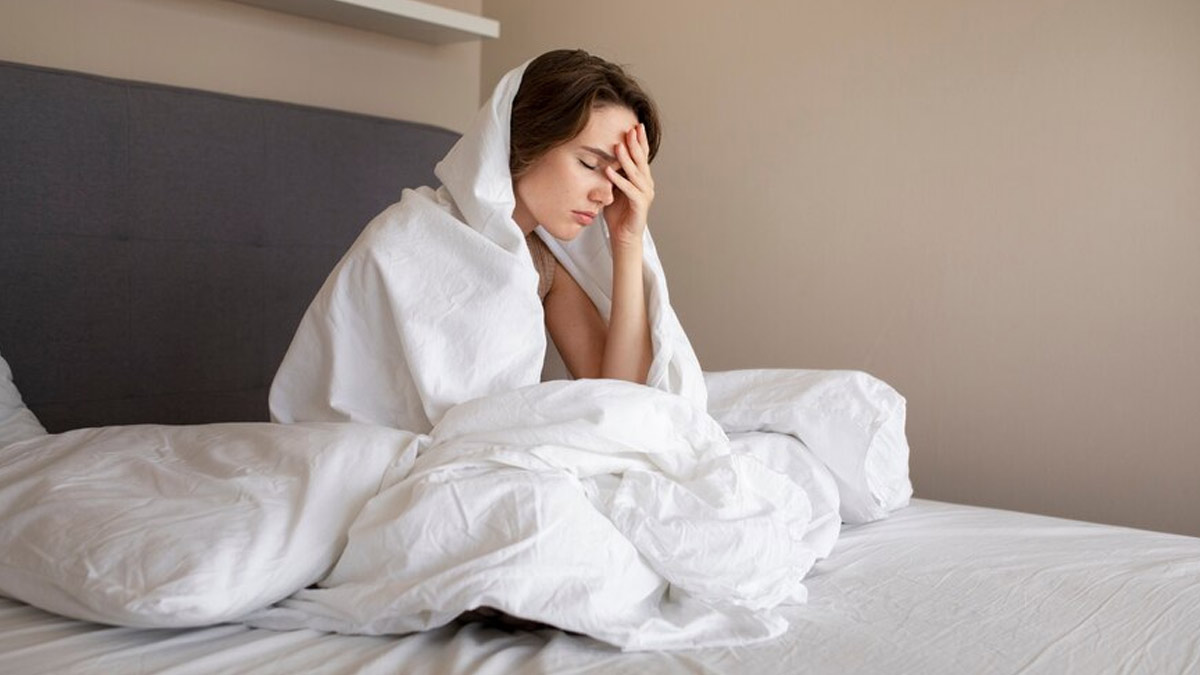
Sufficient sleep is crucial for a healthy body and mind. It is the answer to most of our health problems, including chronic health conditions like heart disease, diabetes, stroke, obesity, and depression. Moreover, a lack of sleep can disrupt our day-to-day functions by causing painful headaches. While the association between the two is complex and so far unclear, Dr Vikram Vikhe, Professor of Medicine at Dr. D.Y. Patil Medical College, Hospital and Research Centre, Pimpri, Pune, suggests that it could be linked to the body's natural sleep-wake cycle.
Table of Content:-
Also Read: How Maintaining A Sleep Schedule Boosts Your Heart Health: Ways To Create One
What Is The Sleep-Wake Cycle?

The circadian rhythm is a 24-hour internal clock in our brain that determines our sleep-wake cycle. It is our daily sleep pattern that responds to light changes in our environment, where darkness signals sleep and brightness promotes wakefulness.
This interplay regulates various sleep stages, from light slumber to deep sleep and dream-filled Rapid Eye Movement (REM) sleep.
Each cycle lasts about 90 minutes, and we typically experience 4-5 cycles per night.
According to Dr Vikhe, sleep deprivation and irregular sleep patterns can disrupt this delicate balance, impacting our health and leading to health problems such as headaches.
How Are Sleep Problems Linked To Headaches?
A study published in Therapeutic Advances in Neurological Disorders found that headaches and sleep problems seem to be a two-way street.
Both migraines and tension headaches can make it harder to sleep well, and not getting enough sleep can trigger these headaches too.
This connection might be because sleep and headaches share various brain structures and mechanisms.
Inside the brain lies the hypothalamus, a tiny control centre responsible for keeping everything in balance, from your body temperature to your sleep schedule. However, any disruption in the balance can lead to sleep disturbances. These can then trigger headaches, including migraines and tension headaches.
Another important player in the sleep-headache connection is the pineal gland, responsible for producing melatonin, the sleep hormone, as per the Sleep Foundation.
When melatonin levels dip, migraines and cluster headaches become more likely, and you might even wake up with a throbbing head.
Also Read: Headache Location: Read To Know What Actually They Mean
Common Causes Of Sleep-Related Headaches

There are various reasons behind headaches caused by a lack of sleep. Dr Vikhe lists:
- Stress and anxiety
- Underlying conditions like diabetes or hypertension
- Irregular sleep patterns, such as waking up early
The doctor warns against consistent disturbances in sleep patterns and recommends seeking medical attention, where treatment options like anti-anxiety medications can help manage symptoms and improve sleep quality.
How To Treat Sleep-Related Headaches?
It starts with improving your sleep hygiene.
Firstly, it is crucial to prioritise 6-7 hours of uninterrupted sleep and maintain a consistent sleep schedule, Dr Vikhe advises.
“If disrupted sleep is due to stress or anxiety, consulting a doctor for low-dose anti-anxiety or antidepressant medications is advised,” he added, cautioning to avoid dependence on medications like benzodiazepines.
Apart from seeking medical help, you can also resort to home remedies, such as:
- Eating a healthy diet
- Monitoring the timing of dinner and post-dinner activities, such as exercise
- Promoting a healthier sleep routine
- Avoiding excessive alcohol consumption or binge drinking
Ways To Improve Sleep

Prevention is the best cure. To avoid or prevent sleep-related headaches, it is important to take the necessary measures to improve your sleep hygiene. Some of the ways to do it include:
- Maintaining a consistent sleep schedule, which involves going to bed and waking up around the same time each day
- Sleeping in a dark, quiet, and calming environment
- Indulging in exercise during the day
- Keeping electronic devices at bay before sleeping
- Avoiding caffeine-rich beverages before bed
Conclusion
Insufficient sleep can disrupt your body's natural sleep-wake cycle, leading to headaches. While it does not cause serious harm, long-term sleep deficiency and headaches can lead to complications. Therefore, it is advisable to consult a healthcare provider and explore your treatment options. The key is to improve your sleep quality to prevent sleep deficiencies and disorders. This, in turn, will help reduce the risk of sleep-related headaches.
Also watch this video
How we keep this article up to date:
We work with experts and keep a close eye on the latest in health and wellness. Whenever there is a new research or helpful information, we update our articles with accurate and useful advice.
Current Version